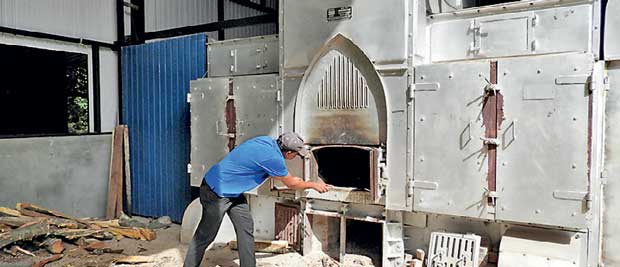Mahir Brothers in Katugastota, in the Matale District, is one of Sri Lanka’s leading exporters of spices, namely nutmeg, pepper, cloves and cocoa. For the past three generations, Mahir Brothers has tried to maintain the consistency of its produce, sometimes travelling far distances in order to dry its spices when the rains inundated the Matale District.
“One of the main preparations in spices is the drying process, which is vital to maintain its aroma, quality and preservation,” explained Ikram Mahir, who runs the family business.
“Drying spices in open spaces also meant contamination from dust and dirt, dilution with sand and stones, etc.”
With access to more modern ideas, Ikram convinced his family to invest in newer technology and in June 2016, Mahir Brothers invested in one of Sri Lanka’s largest biomass-fired dryers through the United Nations Development Programme (UNDP)/Food and Agriculture Organization (FAO) Promoting Sustainable Biomass Energy project.
This biomass-fired dryer has a total capacity of 5000 kilogrammes, which has increased the daily spice production by over 100 percent. The dryer is not weather dependent and can be used every day. Additionally, the quality of the produce has improved because of the mechanism to control heat during the drying process. Wood chips for the dryer is sourced free of charge from the local timber stores.
Mahir Brothers is just one of many entrepreneurs who have benefited from the Promoting Sustainable Biomass Energy project that was started in 2013. This national project is funded by the Global Environmental Facility and executed by the Power and Renewable Energy Ministry. The project is implemented by the Sri Lanka Sustainable Energy Authority in partnership with the FAO and UNDP.
Since its launch, the project has piloted modern biomass energy technologies across the country in support of small and large-scale entrepreneurs and industries to improve and sustain their businesses. Large-scale users include hotels, factories and manufacturing plants, etc. and small-scale users are home-based businesses, cottage industries, government organisations, rural enterprises and entrepreneurs who benefit through technologies that accelerate production and enhance capability through the use of these modern biomass energy technologies.
This five-year energy project works across the fuelwood value chain, tackling barriers for the wider adoption of modern biomass technologies from systematic growing of fuelwood species to mechanized harvesting and pre-processing, transport and storage to the efficient use for industrial processes. Additionally, this initiative supports the conservation of the existing forests and meets the wood energy demand for industries.
A survey conducted by this project has shown that the availability of biomass in home gardens, plantations, farms and agro-forestry systems is much higher than has been estimated. Additionally, to promote and encourage biomass energy supply, many model fuelwood plantations have been set up with the Forest Department, community-based organisations (CBOs), non-governmental organisations (NGOs), plantation industry, Rubber Research Institute and Coconut Cultivation Board. These model plantations have been established to demonstrate sustainable fuelwood supply for industrial and home use.
Monaragala District Hospital practices zero carbon emission
The Monaragala District General Hospital is the largest healthcare institution in the Uva Province catering to over 500,000 patients per year. The hospital comprises 10 wards, an Intensive Care Unit, Preliminary Care Unit, Special Care Unit, Medical Laboratory, Blood Bank, Out Patients Department and a Radiology Department. But what is unique about this hospital is the ‘green’ initiatives carried out under the guidance of Medical Superintendent Dr. R.M.D. Rathnayake.
According to Dr. Rathnayake, the hospital’s ethos is to follow environmental management activities that adhere to zero waste and zero carbon emission through proper energy and waste management initiatives such as bio gas from composting, organic farming and biomass energy practices. This philosophy is diligently and passionately practiced by every member of the hospital’s staff: from tending to the organic vegetable plots to ensuring recyclable bins located all across the hospital premises are being properly used, to feeding the biomass boiler for the use of hot water, etc.
To conform to zero carbon emissions, the hospital collaborated with the Promoting Sustainable Biomass Energy project and installed a biomass boiler that provides hot water (for drinking and personal use) in five of its wards and hot water for cooking and drinking in the kitchens and other uses. The boiler is powered by discarded coconut shells from the kitchen, wood chips from the garden and other biodegradable wastes.
The boiler was commissioned in December 2016 and has a capacity of 12 kW to provide up to 600 liters of hot water per day. The annual greenhouse gas (GHG) reduction is 2.57 tCO2.
According to Dr. Rathnayake, the hospital has recorded a cost saving of almost Rs.115,000 in the first six months since installation. Since its installation, the CO2 saved is 3493.5 kilograms and saving of 4992 kWh of electricity units.
“This is such an achievement towards our goal of zero carbon emissions. Our ultimate goal is to reduce 8000 kilograms of carbon emission per year,” he said.
Nilmini Estates fired by biomass dryer
In Ihala Millawa, Morawaka, in the Matara District, the largest organic tea manufacturer, Nilmini Estates (Pvt.) Ltd, has installed a biomass-fired dryer to facilitate the company’s strong sustainable philosophy of going ‘green’ and zero carbon emission. As one of the most bio-diversified organic tea plantations in Sri Lanka, Nilmini Estates manufactures on average 3000 kilogrammes of green tea leaf daily.
Having previously used two archaic 100-year-old biomass-based (original design was fossil fuels) hot air dryers, the management decided to invest in a 1000 kW (or 250kg made tea output per hour) dryer through the Promoting Sustainable Biomass Energy project. The dryer was commissioned in January 2017 and installed in the factory premises.
Prior to the introduction of the new biomass dryer, the estate was manufacturing up to 110 kilogrammes of tea per hour using the two old dryers.
According to Nilmini Estates (Pvt.) Ltd CEO/Managing Director Prof. P. Abeygunawardena, there were several shortcomings in his daily made tea output. First, the temperature control was extremely difficult in those old dryers. It was uneven and extremely high sometimes and quite low on other occasions. The lack of proper insulation and the inefficient combustion of these old dryers were harmful to his made tea quality and overall output. His employees who worked in the dryer room were very uneasy due to the extreme temperatures that prevailed in the work stations.
He avers that the efficiency of the new dryer has increased production by more than 100 percent, offers a better temperature control mechanism and has increased the control of the biomass feeding. His tea prices have dramatically improved due to better quality and fuelwood consumption per kilogramme has reduced. The labour cost also reduced due to the lesser number of hours now required to run the dryer given the green leaf intake on daily basis.
In addition, the estate has recorded a very low carbon footprint of .51kgs per kilo of made tea, which he considers to be a world record.
“According to online research, there has never been a better carbon footprint recorded anywhere else,” he said.
Prof. Abeygunawardena added that the value addition to date has been the increase in per hour production and the improvement of the quality of tea, which in turn has increased the price of his tea sold at the auctions.
“Overall, the tea has a better aroma, taste and feel, which has been vastly appreciated at the auctions.”
He expressed his total satisfaction with the new dryer project and greatly appreciates the financial grant he received (being the only financial support from any government or private entity throughout his 18-year-old business) from the UNDP Biomass Project.
Lessons learned
With the constant need for hot water in hospitals and the rising cost of electricity, it is prudent that the Monaragala District Hospital has shifted to biomass boilers. The everyday waste from the kitchen, aka coconut shells, food waste, etc. is used at no cost to fire this boiler, thereby ensuring a sustainable supply of fuel for the boiler. The biomass boiler produces clean energy and complies with the hospital’s zero carbon emission ethos. The total cost of the boiler has been recovered in just over two years.
With the tea sector being a major source of economic activity in Sri Lanka, it is vital that tea factories take initiatives to convert to modern efficient technologies that operate on renewable energy sources, rather than depending on fossil fuels that can harm the environment and affect climate change. There is usually a huge saving on electricity and labor with these modern technologies. Sustainably grown fuelwood is, most often, readily available in these estates as well as sustainable fuelwood plantations that can supply this need. The saving of firewood, user-friendliness of the system and ability to produce better quality tea makes this system more viable for our tea producing factories.
In conclusion
With the rising costs of power and energy, labor shortages and increasing climate changes, biomass energy gasification can help control and reduce and be economically sustainable for many industries. The UNDP/FAO has initiated many more successful schemes under the Promoting Sustainable Biomass Energy project, which has shown almost immediate results for the user and the environment.
(For more information on the biomass project, contact Sampath.Ranasinghe@fao.org)

